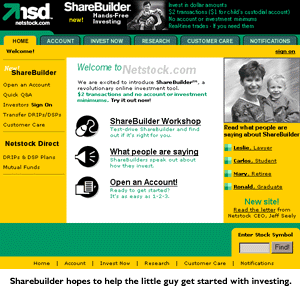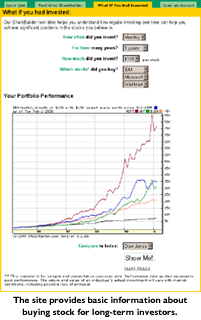|
A stock starter kit
|
 |
February 29, 2000: 8:20 a.m. ET
ShareBuilder aims to help the small investor think big about the market
By Staff Writer Alex Frew McMillan
|
NEW YORK (CNNfn) - Mike Johnson set up ShareBuilder accounts to teach his kids about the stock market. His three kids -- a 15-year-old and two 10-year-olds -- together invest a total of $60 each month in three companies.
Just those three trades might cost $60 a month at an online broker. With ShareBuilder, Johnson pays $3 a month.
"I've been investing for over 15 years and waiting for something like this to come along," he said. But broker fees were always too high. Mutual funds made it hard for his kids to tell what they had invested in, he said.
Johnson's children each picked one company for their investment portfolio -- big-cap stocks Microsoft (MSFT: Research, Estimates), Cisco Systems (CSCO: Research, Estimates) and Dell (DELL: Research, Estimates). "You could spend 10 hours learning about those companies on the Internet," Johnson said. "And sure enough they have."
In the long run, the stocks may gain nicely, but Johnson isn't too worried about that. He isn't too worried about paying $3 to ShareBuilder either. He is preparing his kids for the day they have 401(k)s or similar accounts.
"There's not a college around I can pay $36 a year to learn how the stock market works," he said. Johnson, 40, also has Merrill Lynch and Bank One accounts, but he thinks ShareBuilder is great for novice investors. "It's a good starter kit."
Teaching investing to the little guy
Not that ShareBuilder is just for kids. Johnson, a Greensboro, N.C.-based engineer at aircraft-maintenance company TIMCO, told several co-workers about it. One friend wants to get into the market and is hot on JDS Uniphase (JDSU: Research, Estimates), which closed Monday at 253.
"The poor guy can't even afford to buy one share a month," Johnson said. But he can buy partial shares through ShareBuilder, which holds the rest of the share.

It's a no-frills, all-online brokerage designed for small-time investors. It charges $2 per transaction, or $1 per transaction for custodial accounts like Johnson's, and has no account minimum.
Investors then set up a regular purchase plan, either a direct deposit from a bank or, if an employer allows it, straight from a paycheck. If you make fewer than four transactions a year, there's an $11.95 annual charge at ShareBuilder after the first year, which is free for all accounts. Otherwise there's the $2 charge to buy and a $19.95 charge to sell. There's no minimum monthly contribution, so investors can buy small amounts of stock in around 2,000 companies or index funds.
You can buy direct to skip fees, too
Its parent, Bellevue, Wash.-based Netstock Direct Corp., which started in 1997, launched ShareBuilder late last year. It also has another similar program called Netstockdirect.com. That Web site compiles information on companies offering direct-stock purchase plans, which linked investors with around 600 mainly big companies.
Many large companies let investors buy stock straight from the company and skip broker fees. Procter & Gamble, for instance, requires an initial investment of $250 and $100 for each subsequent investment. Investors contribute when want -- weekly, monthly, quarterly, annually, whatever. The fees are very low. To buy it's $2.50 for a check or $1 for a direct debit. To sell, it's $2.50 with 3 cents commission per share.
Each company's plan differs, so Netstockdirect.com sums them up. It gets paid either by the company or the transfer agent, for reducing investor-relations costs. The end cost to investors is the same.
For certain companies, investors can also apply online through Netstockdirect. That saves having to request paperwork from an investor-relations department, fill it out, and then wait while it's processed.
"What we learned from that is, here's a cool way to invest for the little guy," said Netstock Direct President and CEO Jeff Seely. He said around a quarter-million people have registered for Netstockdirect.com, though they're not all active.
Regular payments take the bite out of investing
But popular stocks such as America Online, Microsoft and Cisco don't let people buy stock direct. So Netstock created the brokerage ShareBuilder, which lets investors buy into 2,000 companies, whether they have a direct-purchase plan or not.
Seely won't reveal how many customers ShareBuilder has, other than to say that on its best days it has signed up 1,500 to 2,000 accounts, near capacity.
"The 150 online brokers have produced a very fine way for investors to invest," said Seely, who came to Netstock from Robertson Stephens, where he was an investment banker. "What's left behind is the person who's got $20,000 in net worth and is trying to build a position for retirement or a college fund."

The typical investor sets up a plan to invest in three or four stocks, he said. "It's very conservative and it's very focused on long-term saving."
Privately held Netstock, which has backers such as GE Capital, Dell Computer and Bowne & Co., may be onto something, according to securities regulators.
"It's much more likely that somebody would be able to invest successfully by having the money set aside to invest every month," said Deborah Bortner, director of securities with Washington State's Department of Financial Institutions. "This is the first time I've seen any company offer this kind of service."
So what's the downside?
There are disadvantages -- ShareBuilder can charge low commissions because it lumps all the purchases together and buys once a week. It's not ideal for someone who likes to find a low-priced stock and buy it right away.
"You don't control the key elements of the transaction, price or timing," said John Gannon, acting director of the Securities and Commission's Office of Investor Education and Assistance. The same is true for direct-stock purchase plans, too. "It's not for someone who is investing for the short term."
The costs need to be weighed, too, even though they're low. On a $100 monthly investment, $2 is still 2 percent. Add the $11.95 a year, and an investor who makes only a few very small buys needs to check the fee schedule. For instance, it costs $25 if you want a stock certificate issued to you.
You will also not benefit from the advice and tools many brokers provide, either on their Web site or over the phone. So you have to have done your research.
Investors need to read the fine print, Gannon suggests. "They need to consider their options," he said. Still, "if you're investing for the long term, it may be a good option for you."
Single stocks don't make sense for everyone
One major caveat of ShareBuilder is that you get limited diversification if you buy one or a few specific stocks. It leaves you with much more stock-specific, even product-specific risk.
Marc Freedman, president of Freedman Financial Associates in Peabody, Mass., doesn't think small-time investors should get into individual stocks at all.
"Unless you have a minimum of $5,000 to invest [each time], you should not be buying individual stocks," Freedman, a certified financial planner, said. He feels that buying individual stocks with small amounts "is inappropriate."
The price you get is likely not as good as the price a professional mutual-fund manager can get, Freedman said. What's more, a no-load fund with a large fund company such as Janus gives you much more liquidity, no fees, professional management and a wide degree of diversification. People getting started should go that route, Freedman said.
"I think it's a loser's game to buy individual stocks at $1,000 a whack," he said. Most brokerages can also set up dividend reinvestment programs for low fees if you hold stock through a brokerage, he pointed out. "You're better off that way."
Still, Netstock hopes it has a couple of interesting options. "We've found it to be a very appealing way of investing for individuals, particularly small investors," Seely said. 
|
|
|
|
|
 |

|

